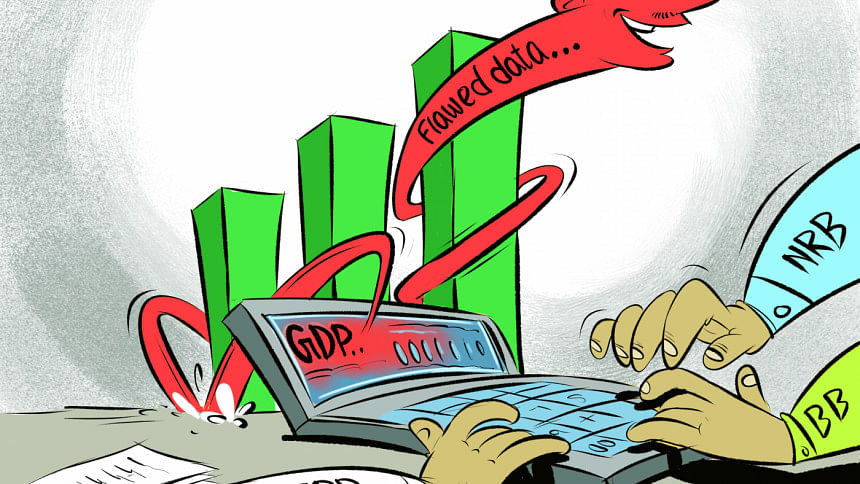Originally posted in The Daily Star on 9 July 2024
 The recently published revised data on the Balance of Payment (BoP) by Bangladesh Bank (BB) is quite revealing, as it reconciled the discrepancy in export income reported by two government organisations: the Export Promotion Bureau (EPB) and the National Board of Revenue (NBR). According to the EPB, exports grew by 3.93 percent during July-April of the fiscal year 2024. However, the central bank has come up with a revised export figure indicating a negative export growth of 6.8 percent during the same period. The reconciled export statistics revealed a discrepancy of $13.8 billion, which means the actual export income was $33.67 billion as opposed to the $47.47 billion shown. In FY2023, the difference of export earnings between the EPB and BB was $12 billion. The reduced export income in the first nine months of FY2024—$13.8 billion—is equivalent to three percent of Bangladesh’s gross domestic product (GDP). According to the Bangladesh Bureau of Statistics (BBS), the preliminary GDP estimate for FY 2024 is $459 billion.
The recently published revised data on the Balance of Payment (BoP) by Bangladesh Bank (BB) is quite revealing, as it reconciled the discrepancy in export income reported by two government organisations: the Export Promotion Bureau (EPB) and the National Board of Revenue (NBR). According to the EPB, exports grew by 3.93 percent during July-April of the fiscal year 2024. However, the central bank has come up with a revised export figure indicating a negative export growth of 6.8 percent during the same period. The reconciled export statistics revealed a discrepancy of $13.8 billion, which means the actual export income was $33.67 billion as opposed to the $47.47 billion shown. In FY2023, the difference of export earnings between the EPB and BB was $12 billion. The reduced export income in the first nine months of FY2024—$13.8 billion—is equivalent to three percent of Bangladesh’s gross domestic product (GDP). According to the Bangladesh Bureau of Statistics (BBS), the preliminary GDP estimate for FY 2024 is $459 billion.

Although the overall deficit in the BoP remains the same, there are internal changes within the BoP statement. The financial account now shows a surplus of $653 million for July-March of FY2024 instead of a deficit of $9.25 billion reported earlier by the BB. This has turned a positive current account into a deficit one. The earlier data by BB covering July-March of FY2024 showed that the current account surplus was $5.8 billion. The corrected data reveals that the current account is in a deficit of $4.1 billion during the same period.
Though the BB has passed the buck to the EPB and the NBR, saying that the NBR made multiple entries of export data received from the EPB, the mismatch of export values among the BB, EPB, and NBR raises a fundamental question regarding the precision of economic reporting and its ramifications for Bangladesh’s economy.
The modification was made in response to extensive criticism of the significant difference between the actual export receipts and the shipment value that has been consistent for several years. For a long time, it has been a mystery how there could be such a large gap between export receipts and shipment values. This correction finally resolved the longstanding mystery surrounding the export data discrepancy. Exporters, who have been experiencing various challenges due to lower global demand and import control by BB, have consistently contended that the export data provided by EPB did not reflect the reality.
The reconciliation of the data among the three important government bodies has led to a surplus financial account and a deficit current account, which, in the end, keeps the overall BoP the same. However, the revised export figures have implications for Bangladesh’s macroeconomic indicators and consequent policymaking.
Due to time lag and disputes, there could be some differences between the BB and the EPB export value data. However, the astronomical difference between the numbers from the two sources in FY2024 surprised everyone. In the absence of any clarification from the government bodies responsible for collecting export data, various explanations have been floating around. For example, the export proceeds could have been brought into the country through informal channels or as remittances. Another plausible reason could be that only a portion of the export proceeds were brought in since there is an expectation of the devaluation of the Bangladeshi taka against the US dollar. The uncertainty before the national elections in early 2024 could also have been a reason for capital flight through not bringing the export proceeds into the country.
But now, the BB has reconciled data on export income from various sources such as EPB and NBR and found that the NBR has been making multiple entries of export income, which led to a discrepancy in export value data. The reconciliation of the data among the three important government bodies has led to a surplus financial account and a deficit current account, which, in the end, keeps the overall BoP the same.
However, the revised export figures have implications for Bangladesh’s macroeconomic indicators and consequent policymaking. A reduction of $13.8 billion in export income during July-April of FY2024 will lead to a downward revision of GDP growth projections not only for FY2024 but also for FY2025. The Ministry of Finance has just announced the national budget for FY2025 in June 2024, which presents the economic outlook for the next three years—from FY2025 to FY2027—based on the Medium-Term Macroeconomic Policy Statement (MTMPS), where projections for various economic indicators are made.
The decline in exports reduces the contribution of exports to GDP, negatively affecting overall economic growth. Due to the export sector’s interconnectedness with other sectors of the economy, including manufacturing, services, and logistics, this impact will be reflected in other economic activities as well. A decline in exports can lead to reduced industrial production, lower service demand, and decreased employment in export-oriented industries.
The export-GDP ratio is a key indicator of the economy. A lower export indicates a potential decline in export competitiveness or demand. Exports and remittances are the primary sources of foreign exchange earnings in Bangladesh. A decline in exports reduces the inflow of foreign currency, negatively impacting the country’s foreign exchange reserves and its ability to finance imports and service external debt.
Similarly, the debt-GDP ratio is a critical indicator of fiscal health and economic stability. A lower GDP growth rate due to declining exports can lead to an increase in the debt-GDP ratio. A higher debt-GDP ratio implies higher debt servicing costs, which can strain public finances. Currently, Bangladesh’s debt stock stands at 37.7 percent of GDP as per the revised budget of FY2024, which is estimated to increase to 38.6 percent in FY2025 as per MTMPS.
Transparency and accountability are crucial for maintaining trust in economic data and policymaking. Enhancing transparency involves public disclosure of data and methodologies. Unfortunately, various government institutions are still reluctant to share data with the public.
The discrepancy in export data and its impact on macroeconomic indicators bring back the broader issue of our data ecosystem.
Accurate economic data is crucial for effective policymaking. The revised export figures will necessitate adjustments in economic policies to address the challenges posed by declining exports. Policymakers will need to take measures to stimulate export growth, diversify the export base, and enhance competitiveness.
Discrepancies in economic data can affect investor confidence. Accurate and reliable data is essential for investors to make informed decisions. To restore confidence, the government and relevant institutions must enhance transparency and accuracy in economic reporting.
The anomalies in export data from various sources reinforce the need to integrate data from multiple sources, providing a more comprehensive and accurate picture of export activities. This also necessitates strengthening institutional coordination. Advanced data analytics and technology are now needed to improve the accuracy and efficiency of data collection and reporting processes.
Though late, this initiative has finally been taken. It is high time we developed standardised data collection and reporting methodologies to ensure consistency and accuracy across institutions. There should be adequate human resources to work on export data at NBR. Besides, the capacity of those engaged in data management should be raised to ensure quality and precision.
Transparency and accountability are crucial for maintaining trust in economic data and policymaking. Enhancing transparency involves public disclosure of data and methodologies. Unfortunately, various government institutions are still reluctant to share data with the public. Now that major economic indicators estimated in the past have become mostly irrelevant, policymakers should revise all economic data and restore transparency to the data ecosystem without delay.
Dr Fahmida Khatun is executive director at the Centre for Policy Dialogue and non-resident senior fellow of the Atlantic Council. Views expressed in this article are the author’s own.
Views expressed in this article are the author’s own.


